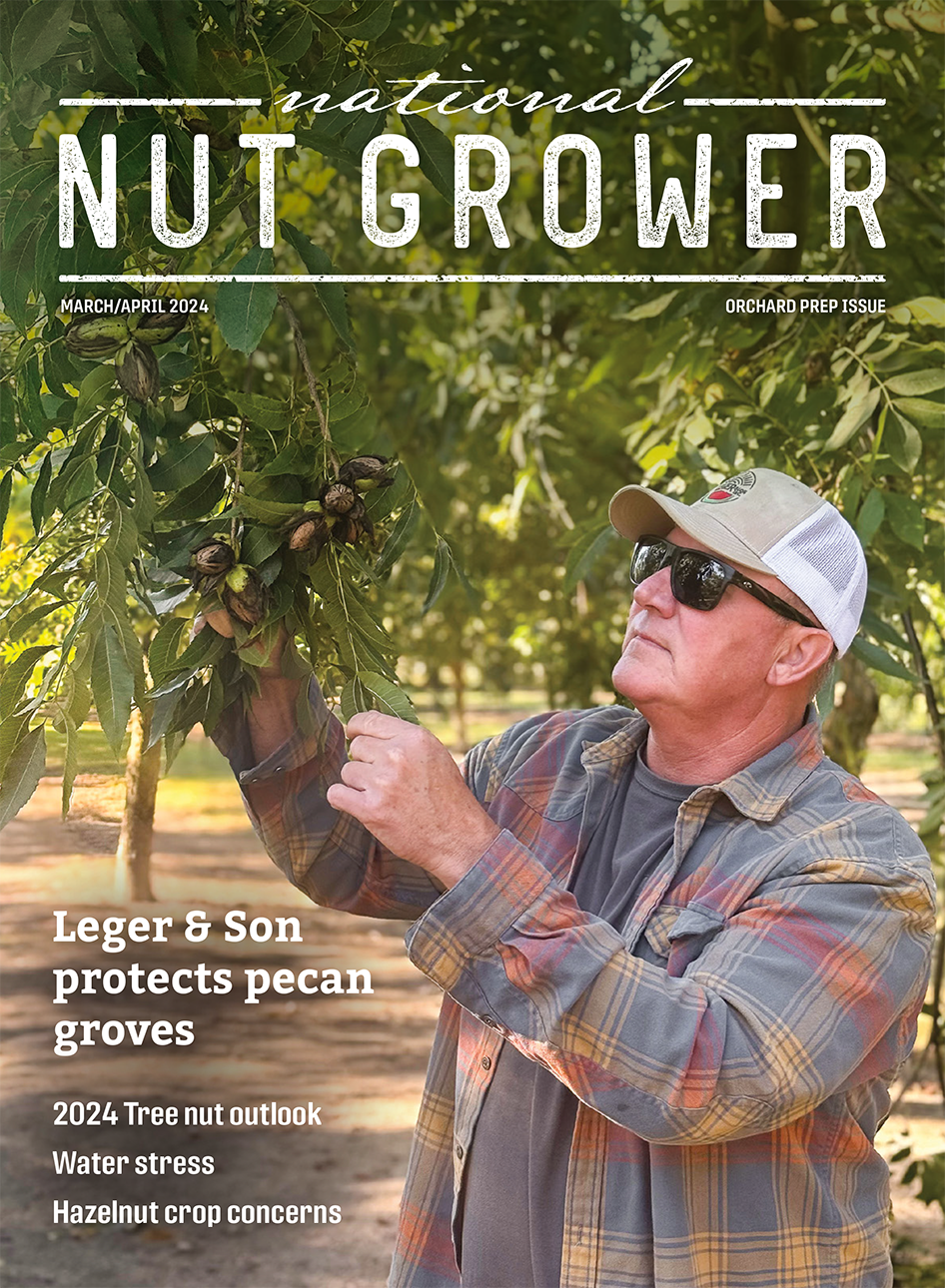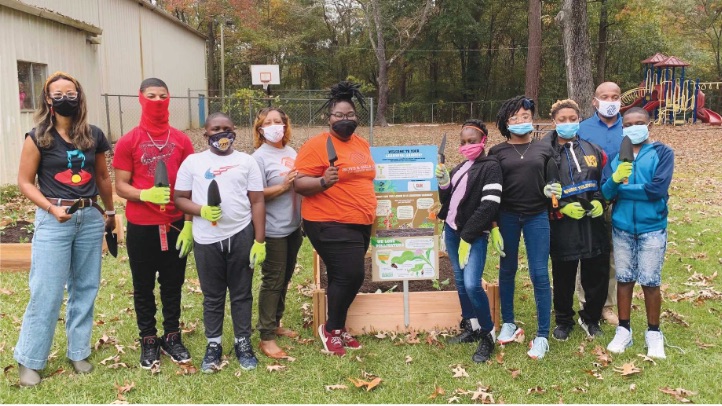
Winter 2021
Partnership targets nation’s food deserts
Some of tree agriculture’s biggest players are looking to change the face of hunger and food accessibility in the U.S. Burchell Nursery, in partnership with Netafim USA and Dole Food Co., has identified some of the nation’s worst food deserts – areas that have limited access to fresh, nutritious, affordable food – and is helping to transform these communities by providing them the trees, irrigation and education to promote healthy food choices and accessibility.
Just under two years ago, and shortly before the coronavirus pandemic upended food supply chains, Dole was looking at the hunger issue through an accessibility lens. From this, the Dole Sunshine for All program was born and set to launch in early 2020, just as all the shutdowns began rolling out across the country. Though delayed, the program finally launched Aug. 1 in Jackson, Mississippi, the first city of many, where it’s common for underserved residents to live 15-20 or more miles from the nearest grocery story that provides fresh produce. Combined with poor public transit, the odds were stacked against this community in terms of food accessibility, and then magnified as effects of the pandemic worsened.
But that is slowly starting to change with the help of these ag companies and the Boys and Girls Clubs of America, which hosts 4,700 locations across the country and three of them currently operating in the Jackson area, and the remaining two to reopen once COVID-19 regulations say it’s safe to do so.
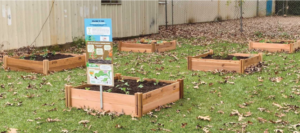
More than an orchard
Dole, with irrigation donated by Netafim and orchard trees provided by Burchell Nursery, is building a fruit orchard in the rural, wooded hills on camp land that belongs to the Boys and Girls Clubs of Central Mississippi. Joining three raised garden beds that are cared for by the children and staff, the orchard will teach students about growing food, making healthier food choices and will open up an entrepreneurial aspect in terms of an expanded farmers’ market.
Tom Burchell, owner of Burchell Nursery, immediately joined the endeavor. The Burchell Nursery Give and Grow Hope program has donated thousands of trees to organizations and areas in need, internationally and locally, such as in Mexico for a home serving at-risk and special needs children, and in Northern California after the devastating Paradise fires.
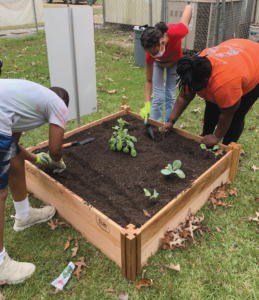 “I love getting involved and providing our fruit trees to communities that really need them,” said Burchell. “When I was asked, I said to sign me up.” It seemed a natural fit for Burchell, and the Boys and Girls Clubs could ensure consistent care of the trees.
“I love getting involved and providing our fruit trees to communities that really need them,” said Burchell. “When I was asked, I said to sign me up.” It seemed a natural fit for Burchell, and the Boys and Girls Clubs could ensure consistent care of the trees.
Burchell’s sentiment echoed throughout all of the organizations that were asked to get onboard, especially the Boys and Girls Clubs of Central Mississippi.
“We were elated,” said Penney Ainsworth, president and CEO of the Central Mississippi clubs, about being chosen for the Dole Sunshine for All program. “With our gardens, the kids would cook their own vegetables that they had grown themselves. Now that we have an orchard, there’s a year-round reason for the kids to get to the garden.”
Naomi Jackson, the clubs’ vice president of operations, was equally excited to hear their clubs were even considered, let alone chosen for the orchard. “We know that there’s an extreme need in our community for it,” she said. Mississippi’s largest industry is agriculture, and there’s often – and unfortunately – the misconception that fresh produce is always readily available and accessible.
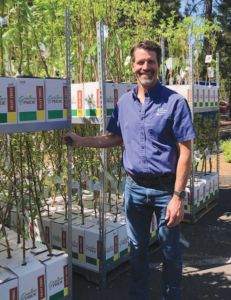
For the initial planting, the fruit orchard requires about one acre of land and is designed to be expanded over time up to 20 acres. It contains peach, plum, apple and persimmon, with the potential for other types of trees to be added, such as Asian pears and pecans. The trees have been specifically selected by Burchell and Up in Farms, a Mississippi-based food hub and growers’ service system, to fit the needs of the club and climate and soil of the area.
Netafim will provide about 100 feet of main line and about 350 feet of lateral line, with two drip emitters per tree.
“In the first year or two, the camp can maintain the trees and get the kids excited and learning and create a positive impact,” said William Evans, director of horticulture at Up in Farms, who also designed the orchard. “Then we can consider expanding to multiple acres, hire a manager and create an income.”
The orchard is designed to be a beginner’s orchard, or, as Evans said, easy as pie.
Twenty-five to 40 trees will be in the ground by early March to get them established before the summer heat. Trees will be planted in 120-foot rows spaced 20 feet apart, with the trees spaced 15 feet apart in order to allow for space for teaching and other camp experiences.
“There are two goals,” said Evans. “An enrichment activity for urban, city kids that exposes them to ag in a safe and compact area, and in the long term to use the orchard as a funding mechanism center for the camp.”
Meals shape attitudes
Dole launched the Culinary Arts Lab, taught by a professional chef, where the children learn to make health-conscious food decisions and prepare healthy meals for themselves and their families.
“In underserved communities, food is a hot commodity,” said Othor Cain, the club’s director of strategic programs and media relations. “It’s much easier to order fast food at a drive-through and send the kids to do their own thing. But if you talk about building a family meal and a program, they know they can drive through the Boys and Girls Club farmers’ market to get some reduced price – or even free – fruits and vegetables. It becomes a level of commitment, building trust around food insecurities, and helping people understand that healthy eating shouldn’t be a second thought or option, but it should be the goal.”
Tackling the level of distrust surrounding food in these communities is no small feat. By making fresh produce more accessible in the communities, a favorable byproduct is improved trust and a changed attitude around food by reminding communities that healthy lifestyles aren’t reserved for particular groups of people.
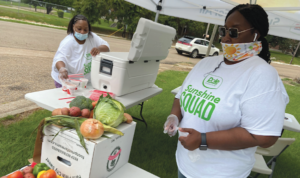
Ebony Yarn, executive assistant to Ainsworth and the “glue” that keeps the operation running smoothly, was herself a club attendee as a young person, and now her own child is an active participant in the club and culinary program. In addition to accessibility, she, like all the staff, sees the intrinsic value of the program. “I would like to continue seeing these healthy recipes put out for the children. If any of these families leave Jackson, they still need to know how to make healthy meals and grow gardens,” she said. “I would love to see the parents and kids sustain what we’re teaching them.”
The program has been well-received thus far, but the work has just begun. Ainsworth knows that what is done in Jackson will have a ripple effect on her community and will serve as a model of how food accessibility can change community health. Burchell is looking forward to seeing the program and community grow. “I hope these trees can be there as a source of income and feed the people,” he said. The program has a list of 50 cities – one in each state – in which Dole, Burchell and Netafim hope to place small orchards and make fresh food more accessible. The program’s next city will be Baltimore, with Detroit and Los Angeles following closely in tow to wrap up 2021.







